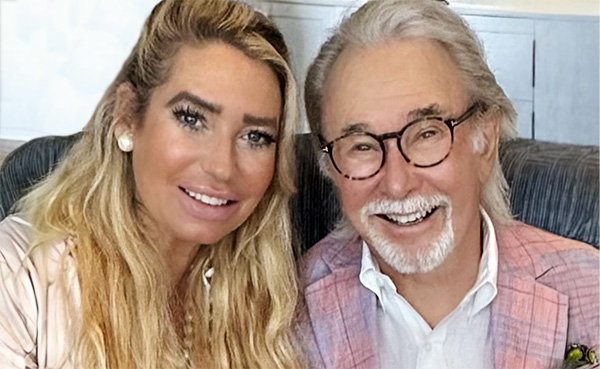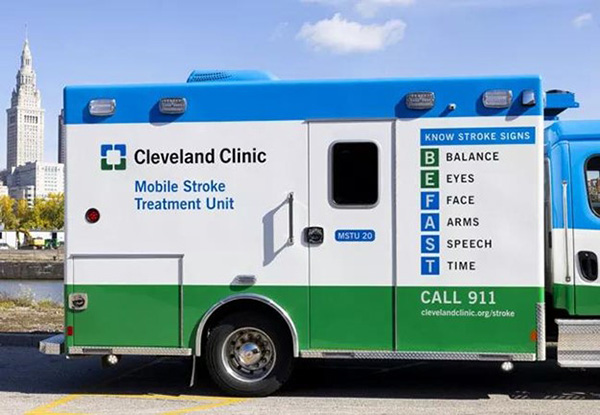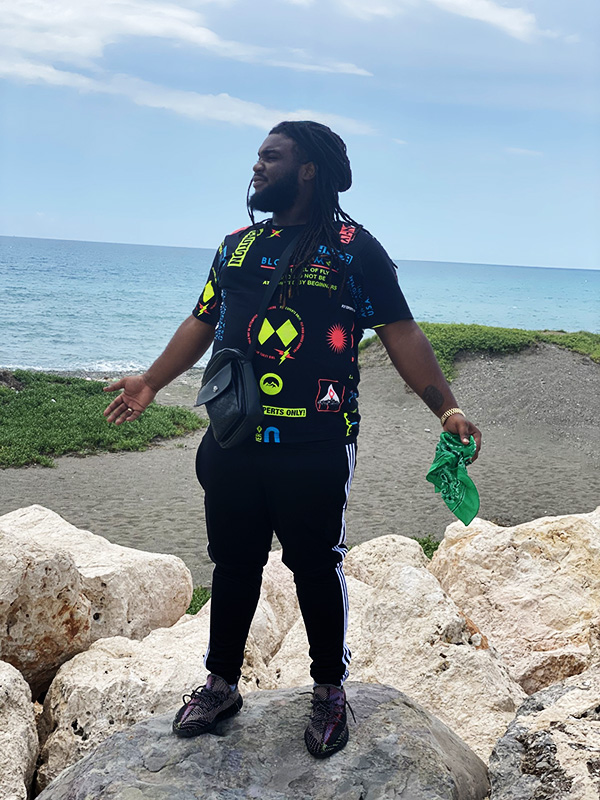Cycling for a Cure

George and Megan Shinn are not only dedicated to each other but also to a cause that has deeply touched their hearts—supporting cancer research at Cleveland Clinic.
The Shinn’s connection to Cleveland Clinic began when Megan’s father underwent an aortic valve replacement at Cleveland Clinic Martin Health in their hometown of Stuart, Florida. The lifesaving procedure and experience left a lasting impression. "We were so impressed with Cleveland Clinic and the doctors," Megan recalls.
When the Shinns learned more about the innovative work and expertise at Cleveland Clinic, especially after visiting the pediatric cancer center at Cleveland Clinic’s main campus, they were moved. "Our hearts just went out to those families with children who have cancer,” says Megan. “The doctors were so loving and had their full hearts into it. How could you not be touched?"
That visit factored into their decision to support cancer research at Cleveland Clinic. To encourage others to give and make their contribution go even further, George and Megan recently created a gift-matching opportunity to support donations to VeloSano, Cleveland Clinic’s year-round cancer research fundraising initiative. To their delight, their donation was matched within hours. When the match day was over, more than 2,000 donations raised a total of $310,000 toward Cleveland Clinic’s cancer research initiatives.
George, a businessman and former owner of the Charlotte Hornets NBA basketball team, has owned several different sports franchises over the years—basketball, baseball and football—but it was cycling that brought him and Megan together.
“When George and I met years ago, George was already an avid cyclist. He used to be a runner and he hurt his feet running, so the next best thing for him was cycling,” says Megan. “On one of our first dates, he said to me, ‘Hey, we're going to go on a 20-mile bike ride.’ And I said, ‘What? What happened to lunch?’”
Now a shared passion for Megan and George, cycling has become a meaningful way for them to contribute to charitable causes. In September, they are traveling to Cleveland to ride 25 miles in Bike to Cure, VeloSano’s annual flagship fundraising event. Megan is riding in honor of a dear friend battling cancer and hopes her friend will be well enough to attend the event. George is riding in honor of his close friend, Olympic figure skater and philanthropist, Scott Hamilton, who has battled cancer. “Cycling together is so nice, especially because we can ride to raise money for cancer. Coming together as a community of people who have the same passion and having that ride—it doesn’t get better than that,” says Megan.
The Shinn’s' commitment to cancer research is deeply personal, extending beyond financial contributions. George is a prostate cancer survivor, and Megan’s grandmothers, mother and aunt all were diagnosed with breast cancer. Megan credits her mother’s survival of inflammatory breast cancer in her 70s to advanced medical care and research. The couple says their philanthropy is about inspiring others to give. “It has to come from your heart. Once it comes from your heart and it’s true, you can become an inspiration to others,” says Megan.
George says their contributions to Cleveland Clinic and other organizations reflect their strong belief in the importance of giving back. “We’ve been blessed, and part of that blessing comes with the responsibility to give back. And that’s what we do as Christians. God blesses us, not just with health, but with all kinds of things, and we give back to him by giving back to his people.”
Celebrating 10 Years of Lifesaving Stroke Treatment

Ten years ago, Cleveland Clinic was fourth in the world—and only the second in the United States—to begin using a mobile stroke treatment unit (MSTU) to shorten the time between the onset of a patient’s stroke-like symptoms and the delivery of life- and disability-sparing therapies for stroke.
Funded entirely through generous philanthropic support from Milton and Tamar Maltz, the MSTU was a new concept that originated in Germany. Peter Rasmussen, MD, then the director of Cleveland Clinic’s Cerebrovascular Center, first told them about it: a “moving emergency ward” for treating stroke. Faster delivery of treatment means a better chance of recovery, he explained, and accelerating treatment by even 10 or 15 minutes can make a tremendous difference.
Understanding the potential lifesaving impact, the couple made a generous gift to Cleveland Clinic through the Maltz Family Foundation of the Jewish Federation of Cleveland. Their gift launched one of the nation’s first mobile stroke units and in less than a month after its rollout in July 2014, the unit already had treated 17 stroke patients.
Bringing the ED to a Patient’s Doorstep
Fast-forward ten years and today, Cleveland Clinic’s MSTU has transported more than 1800 stroke patients, administered IV thrombolysis to more than 200 patients, transported more than 125 brain hemorrhage patients, and helped more than 120 patients undergo a thrombectomy procedure to remove a blood clot from the brain. In 2021, Cleveland Clinic’s MSTU was able to administer IV thrombolysis 37 minutes faster on average than if a patient was transported to an emergency department using a traditional ambulance.
That’s because the MSTU brings the emergency department (ED) — and all steps typically done in it — to a patient’s doorstep, including assessment, computed tomography (CT) angiography and thrombolysis or anticoagulation reversal. A vascular neurologist evaluates each patient via telemedicine, and a neuroradiologist and vascular neurologist remotely assess images obtained by the MSTU CT scanner.
In the MSTU, a CT typically is obtained within eight minutes of patient intake, whereas during that time window with transport by any other means, most individuals would still be on their way to the ED. That efficiency has critical clinical value because 1.9 million neurons are lost for every minute a stroke patient’s brain tissue is deprived of blood flow.
Cleveland Clinic's commitment to this level of service has resulted in care that consistently beats targets and improves patient outcomes.
Young Florida Patient Finds Hope and a Lifeline

At 23, Ikeba Diah was just beginning to embrace adulthood. Having recently moved from Jamaica to Florida, he was full of hopes and dreams when devastating news shattered his world: his liver was failing and he needed a liver transplant immediately. The cause was acute liver failure from regularly consuming too much acetaminophen.
Ikeba was shocked and overwhelmed by the diagnosis. The absence of his family made it even harder. His mother, still in Jamaica, was unable to obtain a VISA to be with him, and his father had unexpectedly passed away the year before.
In October 2023, days after receiving his diagnosis, Ikeba received a lifesaving liver transplant. His care was managed by hepatologist Xaralambos Zervos, DO, Associate Director, Abdominal Transplant Institute at Cleveland Clinic Weston Hospital.
Ikeba spent several months in the hospital, needing multiple surgeries and hemodialysis because of kidney failure. Unable to work, he faced eviction and mounting medical bills, creating stress that threatened his recovery. Despite these hurdles, he found hope and support in his dedicated transplant team at Weston Hospital.
Every Patient Is Treated like Family
"Transplants serve a small part of our community, but they play a lifesaving role during dire circumstances," says Dr. Zervos. "Ikeba's story is a testament to this innovation. He is now a part of our Cleveland Clinic family.”
Ikeba's care coordinator arranged for him to receive assistance from Weston Hospital’s Transplant Patient Support and Education program, which recently received a generous gift from The Willits Foundation. This lifeline provided essential financial support for bills, medications, groceries and other needs, allowing Ikeba to focus on his recovery and rebuild his life.
“Unfortunately, Ikeba’s loss of employment and financial jeopardy is common due to the prolonged extent of illness,” says Dr. Zervos. “This is where we go beyond being just healthcare providers and truly step in as any good family would when a loved one needs assistance. We are fortunate to have generous philanthropy supporters that allow us to help get families fully back on their feet.”
Philanthropy Is a Lifeline for Transplant Patients
With the recent funding from The Willits Foundation, the Transplant Patient Support and Education program has now assisted approximately 100 families with necessities like pre- and post-liver and kidney medications, mortgage assistance, food, gas and pre-transplant dental work.
In addition to providing financial support, The Willits Foundation's generosity has educated more than 60 patients through training with the Florida Organ Transplant Association. The funding also ensures that each discharged patient receives a wellness bag containing educational materials to promote better health outcomes and provide confidence in managing their care.
“I plan to live a long life,” says Ikeba. “I wouldn’t be here today without the Transplant fund’s support for my post-transplant care. I’m eternally grateful to have the team at Cleveland Clinic in my corner.”
How You Can Help
Your gift to the Transplant Patient Support and Education program can bring hope and transform lives. Make a lifesaving impact today.

